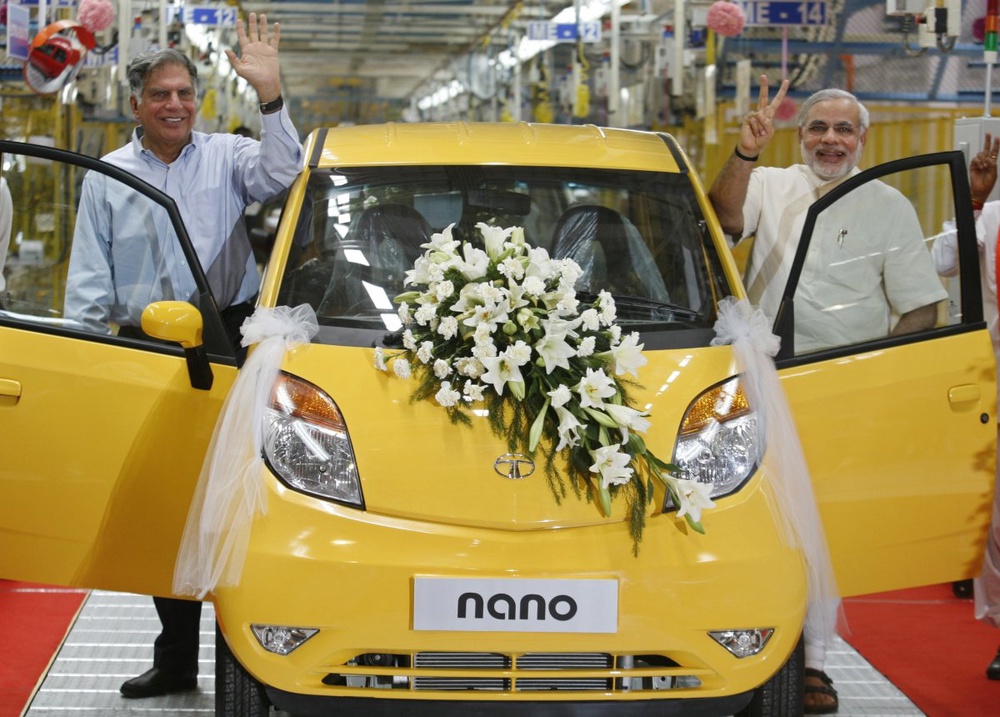
The head of India's vehicle-to-steel conglomerate Tata Group says he still has high hopes for the Nano, billed as the world's cheapest car, despite a slow sales start, AFP reports. "The fundamental economies of the Nano... will continue to establish itself in the Indian market with a wider sales and service network," Tata chairman Ratan Tata said in the firm's annual report released on Friday. Ratan Tata's desire to create a safer, cheap vehicle for families travelling on scooters on India's dangerous roads inspired the creation of the four-door hatchback known as the "people's car". "The potential market for such an affordable car is enormous throughout the developing world," said the 74-year-old Tata, one of India's most respected businessman, who retires at the end of the year. During the last fiscal year, Nano sales rose 10.73 percent to 77,989 units from a year earlier. But the number is still a far cry from Tata's hopes, voiced at the car's unveiling in 2008, of eventually selling a million cars a year. Tata started working on the snubnosed car when he saw families riding scooters -- "the father riding with his young kid standing in front of him, his wife seated behind him holding a baby" -- and being told the death rate for two-wheel riders on India's busy roads was three times that of those in cars. But after the car received global acclaim at its unveiling, the Nano was plagued with start-up problems. A land acquisition row forced Tata to abandon a nearly completed plant and build another, badly delaying production. Tata has insisted the concept of the low-cost Nano, whose base model sells for 154,540 rupees or $2,800, is solid. "The launches of similar small cars (in the Indian market) by others vindicate our belief that this segment was missing in the product line." But after several years of disappointing sales, it has become clear the car's low price and image as a "poor man's car" was actually a commercial sticking point. Rather than embracing the Nano, status-conscious consumers shunned the car's "cheap tag" and opted for slightly pricier rivals or second-hand vehicles. Also, there were also safety concerns after a number of cars burst into flames. To boost sales, Tata has given the car a makeover -- making it available in more colours, sprucing up its interior, offering fast-track loans and a "Tata Nano happiness guarantee" doubling the warranty to four years.





The head of India's vehicle-to-steel conglomerate Tata Group says he still has high hopes for the Nano, billed as the world's cheapest car, despite a slow sales start, AFP reports.
"The fundamental economies of the Nano... will continue to establish itself in the Indian market with a wider sales and service network," Tata chairman Ratan Tata said in the firm's annual report released on Friday.
Ratan Tata's desire to create a safer, cheap vehicle for families travelling on scooters on India's dangerous roads inspired the creation of the four-door hatchback known as the "people's car".
"The potential market for such an affordable car is enormous throughout the developing world," said the 74-year-old Tata, one of India's most respected businessman, who retires at the end of the year.
During the last fiscal year, Nano sales rose 10.73 percent to 77,989 units from a year earlier. But the number is still a far cry from Tata's hopes, voiced at the car's unveiling in 2008, of eventually selling a million cars a year.
Tata started working on the snubnosed car when he saw families riding scooters -- "the father riding with his young kid standing in front of him, his wife seated behind him holding a baby" -- and being told the death rate for two-wheel riders on India's busy roads was three times that of those in cars.
But after the car received global acclaim at its unveiling, the Nano was plagued with start-up problems. A land acquisition row forced Tata to abandon a nearly completed plant and build another, badly delaying production.
Tata has insisted the concept of the low-cost Nano, whose base model sells for 154,540 rupees or $2,800, is solid.
"The launches of similar small cars (in the Indian market) by others vindicate our belief that this segment was missing in the product line."
But after several years of disappointing sales, it has become clear the car's low price and image as a "poor man's car" was actually a commercial sticking point.
Rather than embracing the Nano, status-conscious consumers shunned the car's "cheap tag" and opted for slightly pricier rivals or second-hand vehicles.
Also, there were also safety concerns after a number of cars burst into flames.
To boost sales, Tata has given the car a makeover -- making it available in more colours, sprucing up its interior, offering fast-track loans and a "Tata Nano happiness guarantee" doubling the warranty to four years.

 +7 (777) 001 44 99
+7 (777) 001 44 99















































